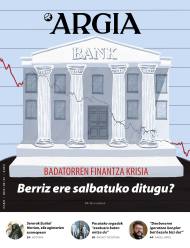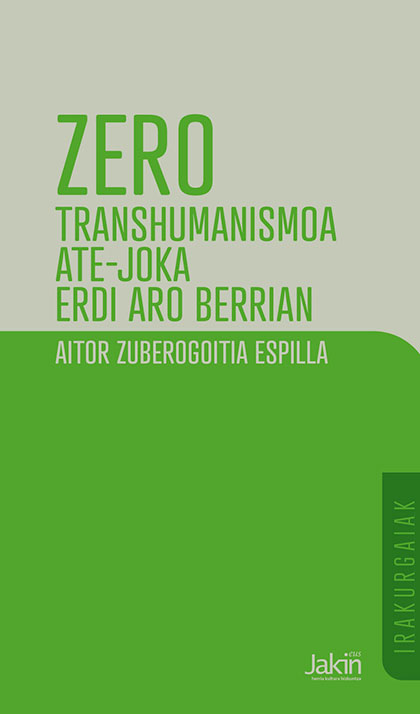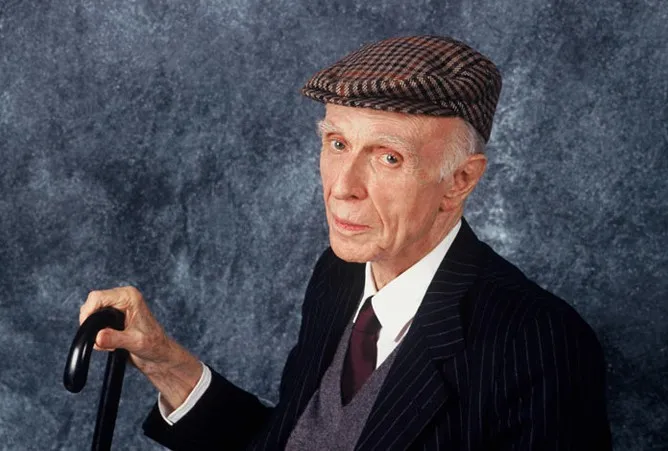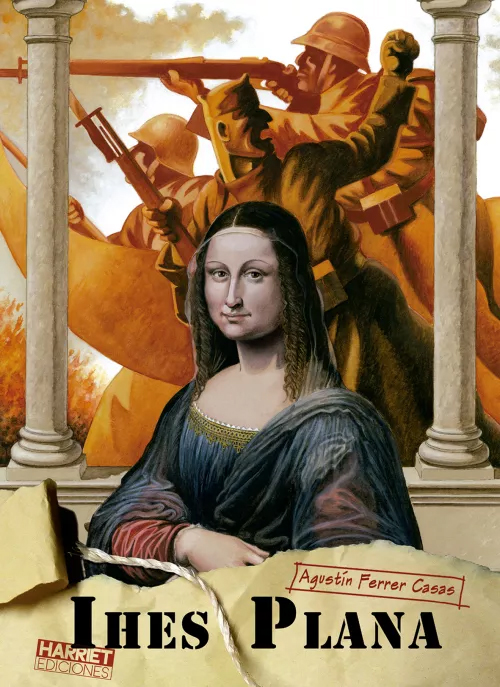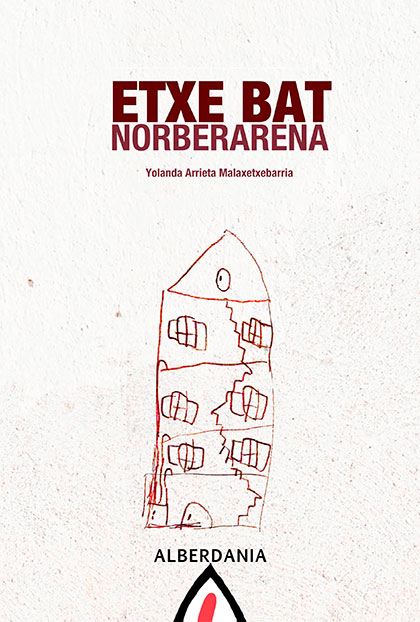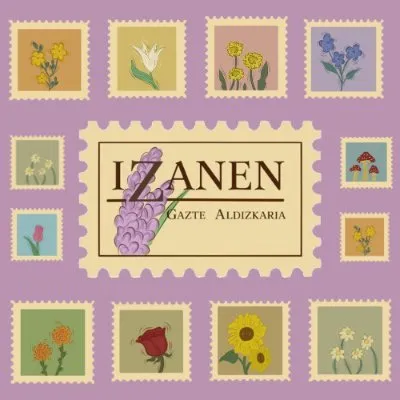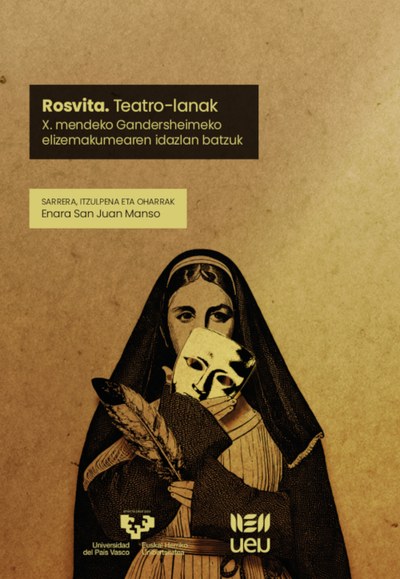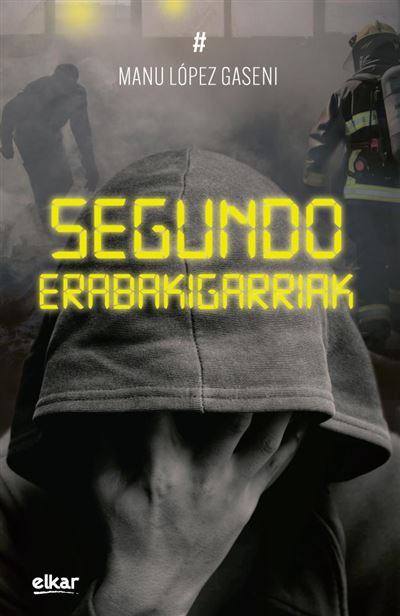"In the end we're going to leave a failure, but beautiful."
- Many will meet Angel Erro thanks to the column he writes daily in Berria (Burlada, 1978); others, to his dietetic Line discontinuous (Elkar, 2019). There was a time, however, that as a poet did not show up for the plaza. After winning the Blas de Otero - Angela Figuera award in 2021, last fall published a book of poems by the editorial Erein - instructions for reading. This year’s Navarra Bookshops Prize has not gone unnoticed. On the day of his reception he spoke to ARGIA.
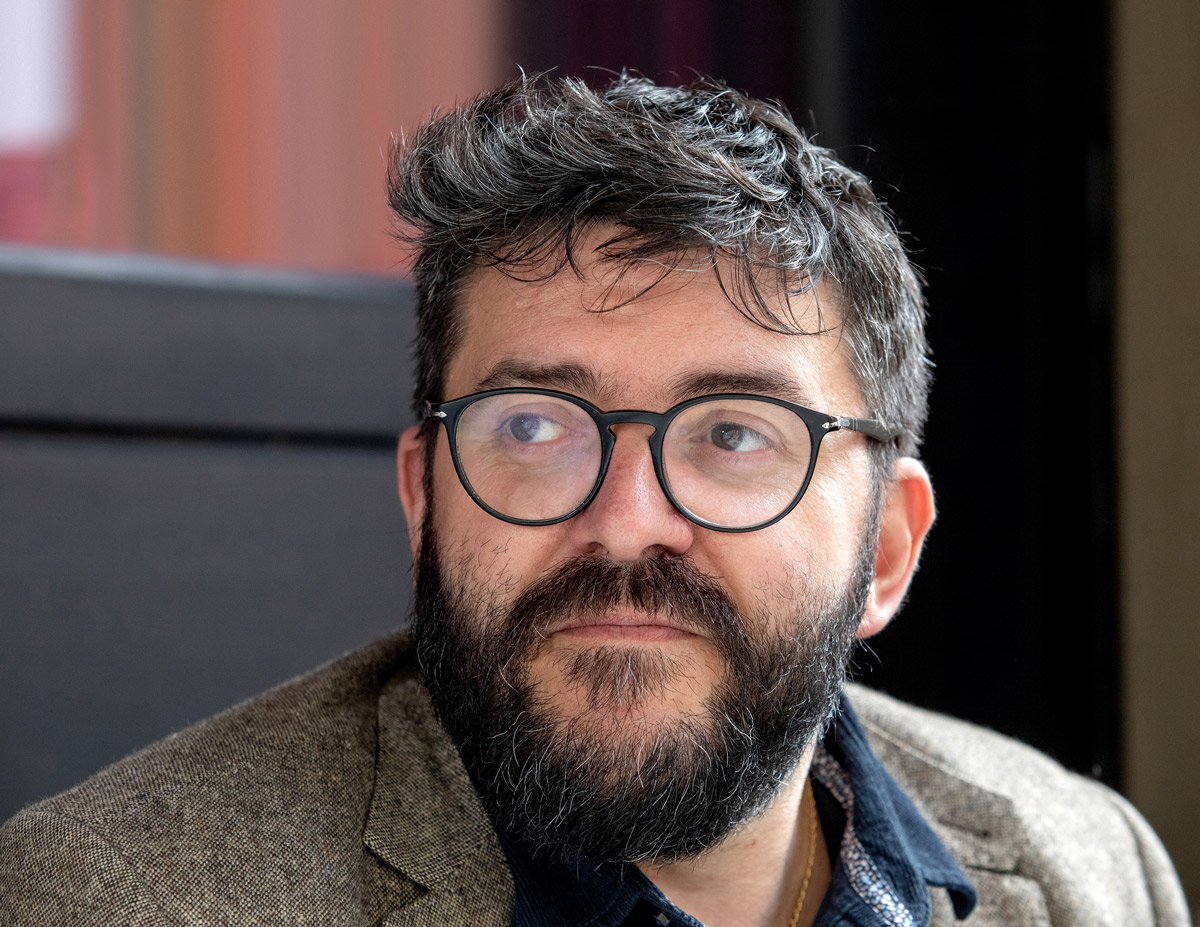
In the title he has given instructions to read the book. Why? There are many reasons and they all work at once. It occurred to
me as a title, I could still use it for a poem, but I thought it could be a good idea to put it all over the book. Then I didn't want that to force him to make a real guide book, although something like that would be ingenious. But I thought it could be a good rain to bring together a wide variety of poems. I think it's a harmless title, it doesn't give people too much fear, I don't say "I don't know what it is," it's not a poetic title.
Have you wanted to facilitate access to the book to the reader? It happens that we all have a bias about what poetry is. And that bias would have to
be broadened, because many times we stayed with those things that maybe we read against during class. Or with topics related to quincy. I think that's the biggest barrier for people to approach poetry. We may not have to approach all the people, but it seemed to me that with a book of poems -- instructions to read -- at least one, some reckless, could fall into my trap and take the book.
He has
compiled poems written at different times. Yes, some are the ones that come in the stream of the book The Humors of the Body (Alberdania, 2005), which can be published in that book, but which have emerged later. Others, related to my mother's death, as occurred with the publication of that previous post, at that time I emerged. And I think there was also some kind of pollution, emotionally and otherwise. And since then, I've also been writing, sometimes thinking about larger projects, of which some remains. I've read again some of the ones I had written and didn't remember them, there were also others I didn't understand... It happened to me, for example, with Sautrela: I published without understanding very well what he meant, but one day, once published, I picked up the book and saw the light: "A, therefore it was a poem about this! ".

It's one of the most hermetic of the book. It's written as a key. I think at an age people write like this, key. We have our problems, our concerns, our secrets
-- and we're airtight, we're cryptic. We understand them and we want people to understand them, but without giving too many clues. And I've written things like that, but I don't know, now I'm not worth it.
Looking for something else?
It's hard to say. I want to have light. Or, well, more than light, I want the difficulty to be somewhere else, not at that level of understanding.
It seems to me that in many of these poems you're exploring in undefined fields, describing ambivalent sensations. This will also have to do with the creation process. Maybe there
are people who plan what they want to write before, what they want to convey, what message to leave -- I admire it because I've tried to do it, but I've failed in all of them, and that's why I've been left with loose poems. I think it works wildly or that it works for me [laughs]. I start with an image or phrase and I keep pulling it. And then I come -- I don't want to give very mystical, but you can get to something you didn't know I wanted to say before.
"I don't want to be very mystical, but you can get to something you didn't know you wanted to say before."
In addition, it is explicitly mentioned in some poems. In the swimmer's poem, in Ian Thorpe's, I say, "This is still not the poem I want to write to you." You can start with an intention and notice "this could
be improved" or "this word is not the one I wanted to use." One option is to stop and leave for another day. And another is to visualize those difficulties. This relaxes us all, makes us more human and more accessible. And it's also a resource to create doubts.
The first poem really marks the tone of the book: it mentions a tired building, the last greeting -- there are many poems dedicated to grief. Would you say death has marked the book a lot? There are some poems of grief, but there are others. I think age also has to do with: I've noticed that I'm
more pessimistic, that I think more about time; I get increasingly darker poems about it, but I try at least to make the tone not that way, as in that meme: there's a black house and it's written the words; and next to it's the same house in color, and above the "music." Very joyful music, but dark letters. What I'm talking about here is sad, because there's grief, time spends -- but what collects what I try not to be that way.

June reminds me of the poem Pello Lizarralde in his novels. This comparison can only disturb
Pello Lizarralde [laughs]. With that, I write and then, when I read again, I ask myself, "Is this going to say something to another person?" I like it a lot, but I also say, "Nothing's happening here." One day, walking -- I can imagine the day I was -- then there's another thing: I have some poems, though I like it, that give me shame or mania. In my first books there are poems that I haven't read in the last 20 years. I take the book in my hands and always pass them. And he says, "If that said something in the moment, there will be something there, you'll have to leave it." But I don't know.
"Time will also pass through words; passing the time of words means that things will be understood differently, incorrectly or differently"
His last book of poems dates back to 2005. Four years ago he published the Discontinuous Line, with texts from his newspapers. Why so long without publishing books? It is true that I let a lot of time go by, but it went unnoticed. I still considered myself a young poet. I sent this book to the contest with this title, but then, when publishing it, I had the doubt that I was about to
be called the young poet. A young poet, a real younger poet, told me it wasn't a good title [laughs]. Youth has always been praised and is related to poetry, there would
be a game like this, "here is a mature poet, but it is still considered a young poet". I think as a poetic writer, because of that grief I've told you before, I stopped: I wrote but I didn't get too excited to publish it. And I've been accumulating things. It hasn't been a bad strategy, because now I have more materials to choose if it can be called strategy. This has happened to me with Linea discontinuous, I have been able to complete a mosaic with things from different places, and with this I have been able to do the same in part.
Before you mentioned Ian Thorpe's poem, there are also Olympic odas in the book. What does sport have as a poetic material? There's something that's very much related to being young in sport, because in that world there's such a fast relay: you like a pelotari, like Irribarria, and you have to change it from your favorite one month
later because you've retired. This speed reflects what others live in other areas.
It also talks a lot about time, about youth -- yes, I'm committed to that. And in addition, the passage of time I live in part as a plot. This is
something we all know, but we reject it. I do not remember who said: it is not logical that everyone should not leave the house screaming, let us die! saying. But if you do, you'll be crazy and you have to hide, ignore, when we're on the street saying, "You're better than ever" -- and I've realized that the time difference also strikes me. For example, the time you're writing and the time someone's going to receive that: there are two times, and at the end of the relationship between writer and reader, at best, there's always that hurdle in the middle. Time will always pass, time will also pass through words; spending time through words means that things will be understood differently, incorrectly or otherwise.
The poet and the beloved are in bed talking about people walking down the street as people who have lost divinity. These poems, with the title "Poets don't know what," though they weren't really like that, I ordered them to create such a story, even though they're written at different times and thinking about different people. And that which speaks to me, yes, it's true -- I struggle to get poetic when I'm dressed in landscape, but love, sex, has that: it abstracts, it elevates you, it exempts you from everything -- but then that's over and there will
be a time to forgive those on the street. We will also have to meet them, after that.
It looks like you look from the distance at people who look like plastic in the poem. That's the good thing: people can understand that they're real mannequins and then you can
read it as if I wanted to say something else. What makes me graceful in this poem is that many mannequins are very stylized, they don't give real people, and they're often headless to give more anonymity. And they're also in a moment of beauty, in a pose and in an attitude -- as an image I was interested in, to realize other concerns that I have of the thoughtless and eternizing.

You've finished the book with the poem Hitzaurrea. I found the end pessimistic, did I want it to be so? I was forced to put the last one because it's called Introduction [laughs]. It's a pretty new poem, one of the last, and it's pessimistic, I haven't gone to the Ali. But I thought, "Put the last one, if someone has come to this, they'll forgive me a bit if I push him into depression." This poem came from a phrase: "We are
a prologue to death, a particular explanation of the general heritage." Perhaps with that phrase I could make a column, the project of another poem, but I got into that poem, in that scene, when you went home after a juerga and... I have no more to declare. I find it undeniable that this is what we are: we go to death, but we are a foreword of our death.
"At an age people wrote it this way, in key. We have our problems, our concerns, our secrets -- and we're airtight, we're cryptic. We understand them and we want people to understand them, but without giving too many clues."
What nobody
wants to read -- Yeah, but well, the verb is played in the future. It is true that even people want me to read now, those who know me as a person are reading me, but there is going to come a time when their acquaintances will disappear and -- I go to the old bookstores and I see many books that nobody reads most of the time. And well, nothing happens, there will come a time when no one wants me to read. And this is also related to old age.
But in some poem he says writing can be an attempt to save himself from death. Yes, but to have a good failure. In the end it's a failure, but well, beautiful. The epic, often, emerges from failures, which we know
a lot as a people.
Zero. Transhumanismoa ate-joka erdi aro berrian
Aitor Zuberogoitia
Jakin, 2024
-----------------------------------------------------------
Hasieran saiakera filosofiko-soziologikoa espero nuen, baina ez da hori liburu honetan aurkitu dudan bakarra. Izan ere, biografia... [+]
Adolfo Bioy Casares (1914-1999) idazle argentinarrak 1940an idatzitako La invención de Morel (Morelen asmakizuna) eleberria mugarritzat jotzen da gaztelaniaz idatzitako literatura fantastikoaren esparruan. Nobela motza bezain sakona da, aparta bere bakantasunean, batez... [+]
Anton Txekhov, Raymond Carver eta Alice Munroren ipuingintzari buruzko mahai-ingurua egin dute Iker Sancho, Harkaitz Cano eta Isabel Etxeberria idazle eta itzultzaileek, Ignacio Aldecoa zenaren ipuin literarioaren jaialdian, Gasteizen. Beñat Sarasolak gidatuta, autore... [+]
Ihes plana
Agustín Ferrer Casas
Itzulpena: Miel A. Elustondo
Harriet, 2024
---------------------------------------------------------
1936ko azaroaren 16an Kondor legioko hegazkinek Madrilgo zenbait museori egin zieten eraso. Eta horixe bera da liburu honetara... [+]
Joan den urte hondarrean atera da L'affaire Ange Soleil, le dépeceur d'Aubervilliers (Ange Soleil afera, Aubervilliers-ko puskatzailea) eleberria, Christelle Lozère-k idatzia. Lozère da artearen historiako irakasle bakarra Antilletako... [+]
Martxoaren 17an hasi eta hila bukatu bitartean, Literatura Plazara jaialdia egingo da Oiartzunen. Hirugarren urtez antolatu du egitasmoa 1545 argitaletxeak, bigarrenez bi asteko formatuan. "Literaturak plaza hartzea nahi dugu, partekatzen dugun zaletasuna ageri-agerian... [+]
Etxe bat norberarena
Yolanda Arrieta
Alberdania, 2024
Gogotsu heldu diot irakurketari. Yolanda Arrietaren obra aski ezaguna zait eta iragan maiatzean argitaratu zuen proposamen honetan murgiltzeko tartea izan dut,... [+]
1984an ‘Bizitza Nola Badoan’ lehen poema liburua (Maiatz) argitaratu zuenetik hainbat poema-liburu, narrazio eta eleberri argitaratu ditu Itxaro Borda idazleak. 2024an argitaratu zuen azken lana, ‘Itzalen tektonika’ (SUSA), eta egunero zutabea idazten du... [+]
SCk Zerocalcareri egindako galdera sorta eta honen erantzunak, jarraian.
Euskal Herriko literatura gaztearen eta idazle hauen topagune bilakatu nahi den proiektu berriaren inguruan hitz egingo dugu gaur.
Rosvita. Teatro-lanak
Enara San Juan Manso
UEU / EHU, 2024
Enara San Juanek UEUrekin latinetik euskarara ekarri ditu X. mendeko moja alemana zen Rosvitaren teatro-lanak. Gandersheimeko abadian bizi zen idazlea zen... [+]
Idazketa labana bat da
Annie Ernaux
Itzulpena: Leire Lakasta
Katakrak, 2024
Decisive seconds
Manu López Gaseni
Beste, 2024
--------------------------------------------------
You start reading this short novel and you feel trapped, and in that it has to do with the intense and fast pace set by the writer. In the first ten pages we will find out... [+]









